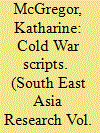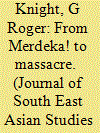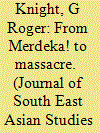| Srl | Item |
| 1 |
ID:
146535


|
|
|
|
|
| Summary/Abstract |
This paper contributes to a growing field of literature on Cold War culture by comparing struggles over memory in Indonesia and Malaysia of anti-communist repressions. It demonstrates the enduring legacies of the Cold War in these neighbouring countries where the war overlapped directly with experiences of colonization and decolonization. I show how and why anti-communism in both countries became a core foundation of both Malaysian and Indonesian nationalism and related religious identification and how this largely explains successive governments’ attempts to memorialize and defend these repressions. I argue that recent attempts by both survivors of the repression and younger Indonesians and Malaysians to reexamine the history of the political left or experiences of repression constitute important efforts to rethink the postcolonial predicaments of both countries in different ways.
|
|
|
|
|
|
|
|
|
|
|
|
|
|
|
|
| 2 |
ID:
117475


|
|
|
|
|
| Publication |
2012.
|
| Summary/Abstract |
Between 1945 and 1965, what may be broadly defined as the politics of sugar in Indonesia passed through several critical stages. The industrial manufacture of sugar had begun in the Netherlands Indies in the mid-nineteenth century, but after a slump during the 1930s Depression, the industry virtually went into abeyance during the Japanese Occupation (1942-45). After the war, the years of struggle for Merdeka! (freedom) also saw a partial revival of the industry, which continued through national revolution and independence (1949) through to an incremental nationalisation in the late 1950s. Developments in the sugar industry culminated in massacre, rather than merdeka, however. The campaign against the PKI (Indonesian Communist Party) which began in 1965 resulted in the murder of labour unionists and peasant activists associated with the sugar industry. This paper traces the course of events from Merdeka to massacre, focusing on the sugar industry of East Java's Brantas valley. Its themes, however, relate to the industry in Java as a whole, and the question of why the commodity production of sugar came to be so deeply embroiled in the politics of the new republic.
|
|
|
|
|
|
|
|
|
|
|
|
|
|
|
|
| 3 |
ID:
117476


|
|
|
|
|
| Publication |
2012.
|
| Summary/Abstract |
Between 1945 and 1965, what may be broadly defined as the politics of sugar in Indonesia passed through several critical stages. The industrial manufacture of sugar had begun in the Netherlands Indies in the mid-nineteenth century, but after a slump during the 1930s Depression, the industry virtually went into abeyance during the Japanese Occupation (1942-45). After the war, the years of struggle for Merdeka! (freedom) also saw a partial revival of the industry, which continued through national revolution and independence (1949) through to an incremental nationalisation in the late 1950s. Developments in the sugar industry culminated in massacre, rather than merdeka, however. The campaign against the PKI (Indonesian Communist Party) which began in 1965 resulted in the murder of labour unionists and peasant activists associated with the sugar industry. This paper traces the course of events from Merdeka to massacre, focusing on the sugar industry of East Java's Brantas valley. Its themes, however, relate to the industry in Java as a whole, and the question of why the commodity production of sugar came to be so deeply embroiled in the politics of the new republic.
|
|
|
|
|
|
|
|
|
|
|
|
|
|
|
|